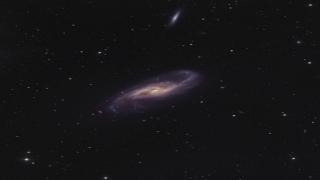Bibcode
Fahed, R.; Moffat, A. F. J.; Zorec, J.; Eversberg, T.; Chené, A. N.; Alves, F.; Arnold, W.; Bergmann, T.; Corcoran, M. F.; Correia Viegas, N. G.; Dougherty, S. M.; Fernando, A.; Frémat, Y.; Gouveia Carreira, L. F.; Hunger, T.; Knapen, J. H.; Leadbeater, R.; Marques Dias, F.; Martayan, C.; Morel, T.; Pittard, J. M.; Pollock, A. M. T.; Rauw, G.; Reinecke, N.; Ribeiro, J.; Romeo, N.; Sánchez-Gallego, J. R.; Dos Santos, E. M.; Schanne, L.; Stahl, O.; Stober, Ba.; Stober, Be.; Vollmann, K.; Williams, P. M.
Referencia bibliográfica
Monthly Notices of the Royal Astronomical Society, Volume 418, Issue 1, pp. 2-13.
Fecha de publicación:
11
2011
Número de citas
51
Número de citas referidas
45
Descripción
We present the results from the spectroscopic monitoring of WR 140
(WC7pd + O5.5fc) during its latest periastron passage in 2009 January.
The observational campaign consisted of a constructive collaboration
between amateur and professional astronomers. It took place at six
locations, including Teide Observatory, Observatoire de Haute Provence,
Dominion Astrophysical Observatory and Observatoire du Mont
Mégantic. WR 140 is known as the archetype of colliding-wind
binaries and it has a relatively long period (?8 yr) and high
eccentricity (?0.9). We provide updated values for the orbital
parameters, new estimates for the WR and O star masses and new
constraints on the mass-loss rates and colliding-wind geometry.
Proyectos relacionados

Las Galaxias Espirales: Evolución y Consecuencias
Nuestro grupo pequeño esta bien conocido y respetado internacionalmente por nuestro trabajo inovativo e importante en varios aspectos de la estructura y la evolución de las galaxias espirales cercanas. Usamos principalmente observaciones en varias longitudes de onda, explotando las sinergías que nos permiten responder a las cuestiones más
Johan Hendrik
Knapen Koelstra